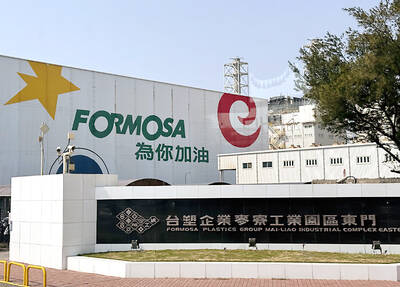International Data Corp (IDC) yesterday released its Taiwan information and communication technology (ICT) predictions for this year and said growth in the entire PC industry would hinge on mini-notebook computers.
“Despite the global economic downturn and companies’ efforts to cut back on capital expenditure, various technologies still have plenty of room for growth, our analyses show,” said Alan Tsao (曹永暉), research manager at IDC’s enterprise solutions group.
The research house said the corporate spending in Taiwan would grow 1 percent, from US$6.33 billion last year to US$6.39 million this year.
The government’s aggressive spending programs, Tsao said, would be counterbalanced by pullbacks in the local financial services and manufacturing sectors.
In terms of hardware development, Helen Chiang (江芳韻), research manager in the PC and peripherals group, said that without doubt mini-notebooks would be the growth engine for the PC industry.
Chiang did not provide growth projections.
Compared with last year, “users will see increased availability in screen sizes, mini-notebooks manufactured by multiple computer vendors and further price reductions,” she said.
Continued decline in panel prices and large volume discounts on central processing units (CPU) would keep mini-notebook prices low, IDC said.
With more PC vendors entering the mini-notebook market this year, the researcher said the sector could be divided into traditional notebooks, netbooks and ultra-mobile PCs based on screen sizes and the CPUs used, such as Atom and Menlow.
Furthermore, 16:9 widescreen liquid-crystal displays (LCD) would become the mainstream configuration as suppliers increase their capabilities on those specifications. The supply-side driven trend would take hold as content is designed for 16:9 screens and full high-definition gets implemented using LCDs, Chiang said.
Presently, 19-in and 22-in screens take up the bulk of the LCD market share — 40 percent and 25 percent respectively. After better resolution is introduced, Chiang said sale of screens larger than 22-in should experience tremendous growth.
Chiang was also optimistic about micro-projectors. Previously, 70 percent of projectors were sold to businesses. With the introduction of micro-projectors and growing interest in multimedia content, it will be interesting to see how this technology fares this year, Chiang said.
Turning to broader trends, IDC saw green information technology getting stronger as companies become more environmentally conscious while cutting costs. The migration to energy-efficient equipments and the consolidation of information and storage systems would be the way ahead, Chiang said.
IDC said cloud computing would diversify into software-as-a-service, platform-as-a-service and hardware-as-a-service segments, with international as well as local companies capitalizing on these opportunities.
Lastly, fixed mobile convergence, Web 2.0 and a changing IT regulatory landscape would also provide many business opportunities this year, IDC said.

EXTRATERRITORIAL REACH: China extended its legal jurisdiction to ban some dual-use goods of Chinese origin from being sold to the US, even by third countries Beijing has set out to extend its domestic laws across international borders with a ban on selling some goods to the US that applies to companies both inside and outside China. The new export control rules are China’s first attempt to replicate the extraterritorial reach of US and European sanctions by covering Chinese products or goods with Chinese parts in them. In an announcement this week, China declared it is banning the sale of dual-use items to the US military and also the export to the US of materials such as gallium and germanium. Companies and people overseas would be subject to

Taiwan Semiconductor Manufacturing Co (TSMC, 台積電) founder Morris Chang (張忠謀) yesterday said that Intel Corp would find itself in the same predicament as it did four years ago if its board does not come up with a core business strategy. Chang made the remarks in response to reporters’ questions about the ailing US chipmaker, once an archrival of TSMC, during a news conference in Taipei for the launch of the second volume of his autobiography. Intel unexpectedly announced the immediate retirement of former chief executive officer Pat Gelsinger last week, ending his nearly four-year tenure and ending his attempts to revive the

WORLD DOMINATION: TSMC’s lead over second-placed Samsung has grown as the latter faces increased Chinese competition and the end of clients’ product life cycles Taiwan Semiconductor Manufacturing Co (TSMC, 台積電) retained the No. 1 title in the global pure-play wafer foundry business in the third quarter of this year, seeing its market share growing to 64.9 percent to leave South Korea’s Samsung Electronics Co, the No. 2 supplier, further behind, Taipei-based TrendForce Corp (集邦科技) said in a report. TSMC posted US$23.53 billion in sales in the July-September period, up 13.0 percent from a quarter earlier, which boosted its market share to 64.9 percent, up from 62.3 percent in the second quarter, the report issued on Monday last week showed. TSMC benefited from the debut of flagship

TENSE TIMES: Formosa Plastics sees uncertainty surrounding the incoming Trump administration in the US, geopolitical tensions and China’s faltering economy Formosa Plastics Group (台塑集團), Taiwan’s largest industrial conglomerate, yesterday posted overall revenue of NT$118.61 billion (US$3.66 billion) for last month, marking a 7.2 percent rise from October, but a 2.5 percent fall from one year earlier. The group has mixed views about its business outlook for the current quarter and beyond, as uncertainty builds over the US power transition and geopolitical tensions. Formosa Plastics Corp (台灣塑膠), a vertically integrated supplier of plastic resins and petrochemicals, reported a monthly uptick of 15.3 percent in its revenue to NT$18.15 billion, as Typhoon Kong-rey postponed partial shipments slated for October and last month, it said. The